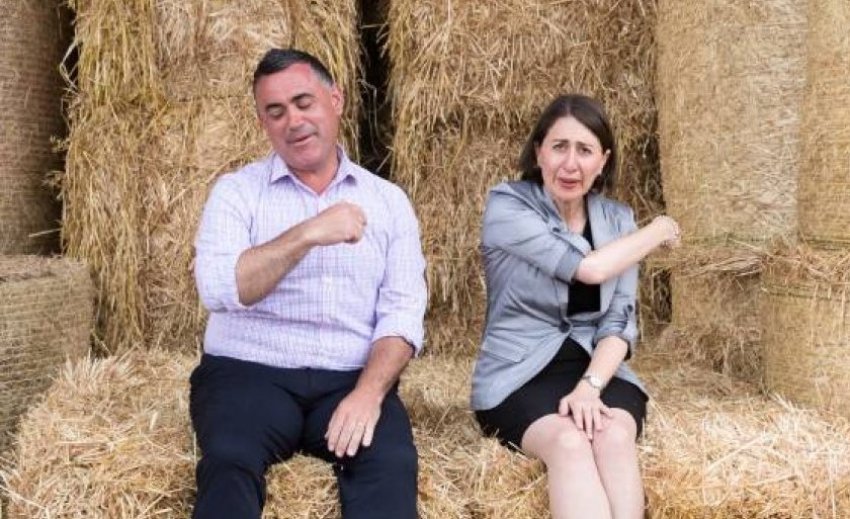
The devastating Black Summer fires that wiped out townships up and down the New South Wales coast also wiped out about 5000 koalas. The popular but endangered marsupial native now seems to be the cause of a ruckus inside the NSW Coalition.
While intact for the moment, the future of National Party leader John Barilaro is in doubt after Liberal Premier Gladys Berejeklian forced him to accept Coalition policy on protecting koala habitat on September 11.
In the days prior, Barilaro had been grandstanding about how his National Party MPs would threaten to bring down the government and move to the backbench if the Premier did not amend the koala protection policy. National MPs all backed their maverick leader.
Berejiklian, with only a two-seat majority in the Legislative Assembly, said she would govern as a minority if necessary.
While there has been much speculation about Barilaro’s motives, the apparent trigger for this outburst was the Koala Habitat Protection State Environment Planning Policy (SEPP), which requires that property owners take several more modest steps before they can submit a development application. It expands the list of trees considered vital to the iconic marsupial’s survival.
The National Party is facing a growing threat to its seats on the NSW north coast, from the Greens and the Shooters, Farmers and Fishers Party (SFF), the latter needling the Nationals from the right. The SFF opposes any limits of the right of land-owners to sell their properties to developers for new housing projects.
The new SEPP would be a guideline for NSW authorities to determine if the animals would be threatened by land clearing for development. It applies to the whole state and includes an updated definition of what constitutes a “core koala habitat” and a “streamlined” development application process.
The old SEPP was repealed on March 1, and the updated guidelines oblige landowners to provide more evidence that proposed developments will not impact koala habitats.
Barilaro described the new SEPP as a “nail in the coffin of farmers”, saying it creates unfair amounts of “red and green” tape for landowners.
But spokesperson for the Nature Conservation Council (NCC) Chris Gambian said the new SEPP is a “small measure” that gives landholders “more certainty and more information about critical habitat on their properties”.
“Koalas are on track to become extinct by 2050 if we don’t stop cutting down their trees and destroying their forests. If the Nationals get their way, that could happen in the next decade. Wanting to retain the right to kill koalas is an extraordinary hill for the Nationals to want to die on, but here we are.”
The NCC said Barilaro has forced the Liberal Party to accept outdated environmental policy for a decade, including allowing more land to be cleared, defending feral pests, bungling water management and intensifying logging after the bushfires.
“They have also promoted extremist fringe ideas that have been debunked decades ago, like uranium and coal seam gas mining,” said Gambian.
Greenpeace Australia Pacific is also urging Berejiklian not to budge. “When you thought that 2020 could not become even more bizarre ... John Barilaro appears ready to sacrifice his political career to preserve developers’ rights to raze koala habitat with impunity,” said Greenpeace spokesperson Martin Zavan said.
“Koalas could be wiped out completely in NSW by 2050 and Barilaro appears hellbent on bringing forward this grim deadline by holding the government to ransom as it deals with the pandemic and economic crisis.”
At the last state election, the Nationals faced a movement against them for their support for coal seam gas; the party lost two seats to the SFF.
More recently, Barilaro has aligned himself with Mark Latham, from Pauline Hanson’s One Nation, to push for the 33-year ban on uranium mining to be lifted. The new Liberal environment minister Matt Kean is on record as being a supporter of renewable energy.
Whether any of this has anything to do with Barilaro’s brinkmanship remains unclear. What is clear is that he has overplayed his hand on an issue that crosses party lines: protecting koalas in NSW. On the morning of September 11, more than 70,000 people had sent emails to Coalition MPs calling for them to support endangered koalas.
“People who have lived on the land for generations love the bush and share our goal of ensuring koalas survive and thrive into the future,” Gambian said.
“Barilaro says he’s for farmers and the bush, but all of his actions show he is the mouthpiece of the minerals industry, multinational irrigation corporations and big agribusinesses.”
A key issue behind the koala dispute seems to be property development. The Sydney Morning Herald on September 16 reported that a major NSW property developer and a former Newcastle mayor Jeff McCloy had complained to Barilaro’s electorate office about the new policy, and that the complaint had been passed on to the planning minister.